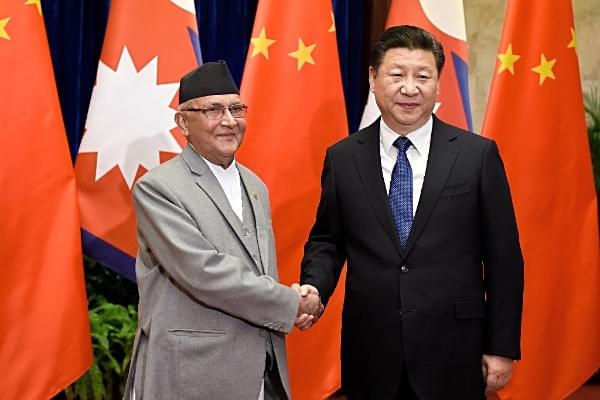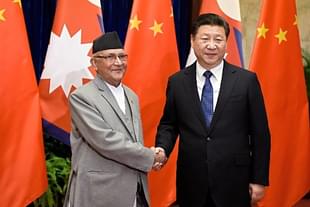World
Explained: Why Nepal’s PM Is Breaking Tradition With A Desperate Dash To China Instead Of Visiting India
Jaideep Mazumdar
Nov 04, 2024, 05:57 PM | Updated 05:57 PM IST
Save & read from anywhere!
Bookmark stories for easy access on any device or the Swarajya app.


Nepal’s Prime Minister Khadga Prasad Sharma Oli is planning a three-day visit to China early next month instead of adhering to tradition and making New Delhi his first port of call.
Nepal’s Prime Ministers traditionally make their first official visit to India. Oli took over as the Himalayan nation’s Premier on 15 July this year and has, since then, been waiting for an invitation from New Delhi to visit his southern neighbour.
But even though the invitation (from New Delhi) has not materialised as yet, that is not why Oli is planning to visit China before landing in India.
After becoming Prime Minister, Oli's first overseas visit was to New York in September this year to attend the 79th session of the United Nations General Assembly. However, this visit was not a bilateral trip to any other country.
Indian Prime Minister Narendra Modi met Oli on the sidelines of the UN General Assembly on 23 September and discussed bilateral ties. However, according to officials of India’s Ministry of External Affairs (MEA), Modi did not invite Oli to visit New Delhi.
Instead, to the confusion of Nepal’s foreign ministry, Modi told Oli that he would be visiting Nepal soon. Oli reportedly responded that Modi would be “most welcome” to visit Nepal at any time of his (Modi’s) choice.
The real reason for Oli's planning to visit China is his desperation to get concessions from Beijing on China’s Belt & Road Initiative (BRI) projects in Nepal.
Although Nepal and China signed the BRI agreement in 2017, no projects have materialised in Nepal under China’s grand global initiative to enhance infrastructure and build links across land and sea with various parts of the world.
Instead, a bellwether project—the Pokhara International Airport, which Nepal built with a $215.96 million loan from China’s Exim Bank—has turned out to be a massive white elephant.
Nepal hoped that international flights would land at the new Pokhara airport, which was commissioned in January 2023.
But with India refusing to use its airspace for flights headed for or originating from Pokhara International Airport, the new airport has turned into a severe loss-making one.
It has also become a highly controversial project after reports appeared that China is charging Nepal an annual interest of five per cent (instead of the less than two per cent charged by global lending institutions like the IMF and World Bank) on the loan it gave for constructing the airport.
There have also been allegations of corruption, inflating costs and non-adherence to quality standards in the airport’s construction, prompting the then government headed by Pushpa Kamal Dahal to order an enquiry by Nepal's Commission for the Investigation of Abuse and Authority into the construction of the airport in November last year.
All of this, along with BRI projects in other countries becoming burdensome white elephants—such as the Hambantota project in Sri Lanka, from which China extracted undue concessions—has raised alarms among Nepal’s politicians, particularly the leadership of the Nepali Congress (NC).
Oli Wants To Save BRI Projects
However, Oli, who is regarded as a close ally of China and a strong advocate for BRI projects, aims to expedite their implementation in Nepal.
The NC, a key partner in the current ruling alliance, insisted that any BRI projects implemented in Nepal should be financed through grants rather than loans from China.
The NC also insists that if China cannot give grants to fully finance BRI projects in Nepal, it should offer loans at concessional terms and interest rates lower than what is charged by international lending institutions like the IMF and World Bank to fund the projects.
In any case, says the NC, the loan component of BRI projects should not exceed 50 to 60 per cent of the project cost and the rest should be in the form of grants from China.
Of course, Beijing is reluctant to agree to these terms and has been leaning heavily on Oli, seen as its proxy in Nepal, to start work on at least a few of the nine BRI projects that have been agreed on.
The nine projects include the Rasuwagadhi-Kathmandu road upgrade, Kimathanka-Hile road construction, Dipayal-China road, Tokha-Bidur road, the Galchhi-Rasuwagadhi-Kerung 400 kV transmission line, the Keyring-Kathmandu rail (feasibility study), the Tamor Hydroelectricity Project (762 MW), the Phukot Karnali Hydro Electric Project (426 MW), and the establishment of the Madan Bhandari Science and Technology University.
Nepal and China have recently exchanged letters to upgrade the 8.2-kilometre Kalanki-Maharajgunj Ring Road, construct an Integrated Check Post (ICP) and an Inland Container Depot (ICD) at Korala in Mustang, and conduct a feasibility study for the repair and maintenance of the Araniko Highway.
However, to Nepal's chagrin, China has included these additional projects under the BRI framework, despite having no such agreement with Nepal.
Oli believes he can persuade his alliance partner, the Nepali Congress, to agree to implement BRI projects in Nepal under China's usury terms if China makes a significant gesture, such as waiving the $215.96 million loan for constructing the Pokhara International Airport.
“Oli thinks that if China waives the loan, he can present the Pokhara International Airport as a ‘no-strings-attached gift’ to the people of Nepal. He hopes this will portray China positively and silence critics of BRI projects,” senior NC leader Prashant Giri told Swarajya from Kathmandu.
Oli’s chief political advisor, Bishnu Rimal, also confirmed that the Pokhara airport loan waiver will be on top of the Nepal PM’s agenda during his visit to China.
A senior leader of Oli’s Communist Party of Nepal (Unified Marxist Leninist), or CPN-UML, told Swarajya that in addition to this loan waiver, Oli will also seek funding from China to implement any big project under the Trans-Himalayan Multi-Dimensional Connectivity Network.
The two countries recently signed an MoU to implement various connectivity and infrastructure projects under this network.
“The Prime Minister will request China to fund a major project under this network as an outright grant in order to sweeten the BRI and make it acceptable to all political parties and the people of Nepal,” said CPN-UML leader and parliamentarian Ishwar Bahadur Rijal told Swarajya.
Why BRI Matters To Oli
Oli has little to show in terms of development despite having been in power twice earlier: for ten months from October 2015 and again for nearly 3.5 years between February 2018 and July 2021.
Even over the past three-and-half months that he has been in power, Oli has done little. He is widely perceived in Nepal as being China’s stooge and a power-seeking politician.
Oli has failed to initiate development projects even in his current stint as Prime Minister. Thus, his image has taken a beating and the perception that he is only interested in clinging to power at any cost has deepened.
Nepal's economy has struggled post-COVID, and the country lacks the resources for Oli to undertake any significant infrastructure or welfare projects on his own.
He needs to initiate at least some BRI projects to reshape his image and present himself as a man of action. However, by unilaterally implementing these projects, he cannot afford to alienate the NC, whose support he depends on.
Oli has to sweeten the BRI deal and make it acceptable to the NC. Knowing that China is unlikely to agree to fund BRI projects as grants or lower interest rates on loans, as the NC demands, he seeks a few grand gestures from Beijing that he hopes will help him counter the NC's opposition.
But China Is Unlikely To Play Ball
There is little chance, however, of China agreeing to Oli’s requests.
The Oli administration formally requested China to waive the Pokhara airport loan during a meeting in Kathmandu on August 23 between Deputy Prime Minister Bishnu Prasad Paudel, who also holds the finance portfolio, and Yang Weiqun, vice chairman of the China International Development Cooperation Agency (CIDCA).
The chief of the International Economic Cooperation Coordination Division at Nepal’s Ministry of Finance handed over a letter making this request (for waiving the loan for the construction of Pokhara International Airport) to Yang Weiqun.
However, Beijing has not responded to the letter. Deputy PM Paudel reiterated this request during his visit to China in late September, but Beijing remained non-committal.
China believes that granting Nepal's request for a loan waiver would open the floodgates to similar demands from other countries. This would undermine China's strategic plan to leverage unsustainable BRI projects to pressure creditors into granting concessions, such as allowing military access to their territories.
Thus, China is unlikely to agree to Oli's requests. Instead, Beijing is likely to push Oli to initiate some major BRI projects in Nepal immediately, without altering the existing terms and conditions governing these projects.
Oli's only hope is that his appeals to China's top leadership, as a fellow communist facing difficulties in his own country, will resonate with them.
But what Oli doesn’t seem to have reckoned is that the Chinese are largely focused on their business interests and are unlikely to be swayed by his emotional appeals. As a result, Oli’s dash to Beijing is likely to be an exercise in futility.
Also read: Why India Should Be Concerned Over Chinese-Built Airport At Nepal’s Pokhara Becoming A White Elephant And A Chinese Outpost





